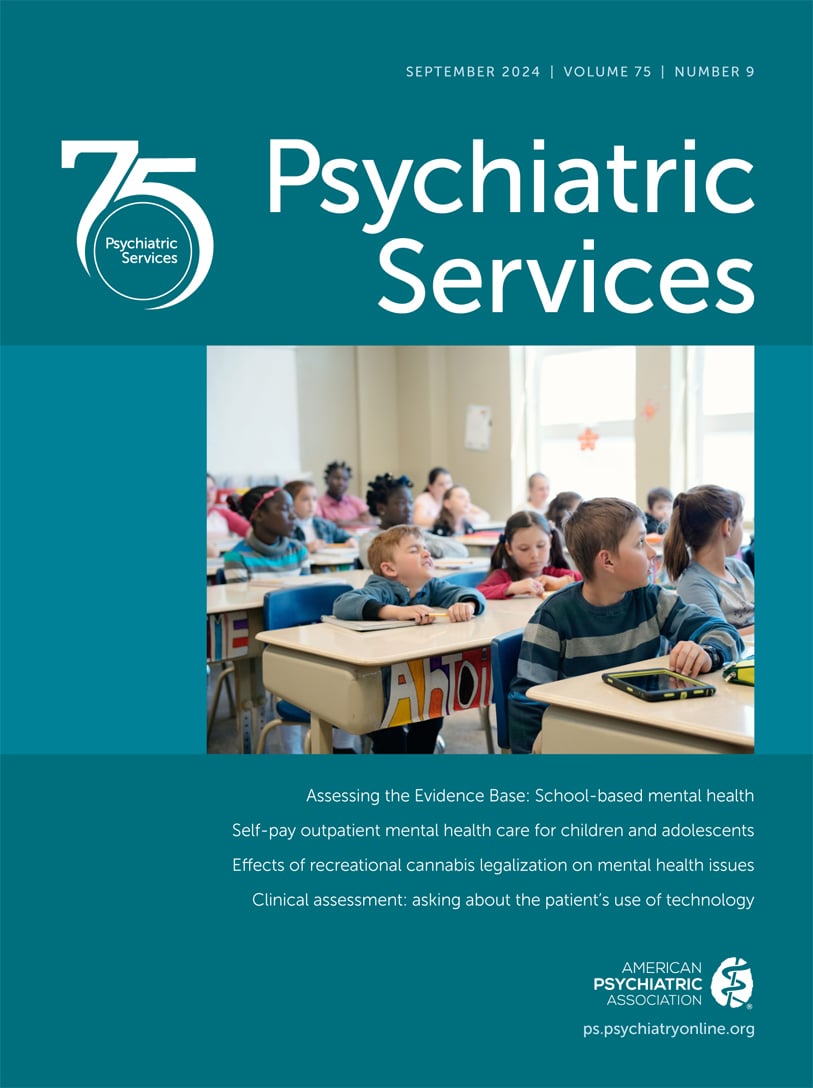Psychiatric Services
- Volume 66
- Number 7
- July 2015
This Month’s Highlights
Special Section: RAISE and Other Early Intervention Services
Taking Issue
Publication date: 16 March 2015
Pages680–690Comprehensive coordinated specialty care programs for first-episode psychosis have been widely implemented in other countries but not in the United States. The National Institute of Mental Health’s Recovery After an Initial Schizophrenia Episode (RAISE) ...
https://doi.org/10.1176/appi.ps.201400413Publication date: 16 March 2015
Pages691–698Objective: The RAISE (Recovery After an Initial Schizophrenia Episode) Connection Program Implementation and Evaluation Study developed tools necessary to implement and disseminate an innovative team-based intervention designed to promote engagement and ...
https://doi.org/10.1176/appi.ps.201400281Publication date: 15 April 2015
Pages699–704Objective: This study assessed factors that facilitated or impeded clients’ engagement in services offered by the Recovery After an Initial Schizophrenia Episode (RAISE) Connection Program for youths and young adults experiencing early psychosis. It was ...
https://doi.org/10.1176/appi.ps.201400475Publication date: 02 February 2015
Pages705–712Objective: This study sought to determine the effectiveness of a comprehensive first-episode service, the clinic for Specialized Treatment Early in Psychosis (STEP), in an urban U.S. community mental health center by comparing it with usual treatment. ...
https://doi.org/10.1176/appi.ps.201400236Publication date: 15 January 2015
Pages753–756Objective: This study is the first to examine duration of untreated psychosis (DUP) among persons receiving care in community mental health centers in the United States. Methods: Participants were 404 individuals (ages 15–40) who presented for treatment for ...
https://doi.org/10.1176/appi.ps.201400124Publication date: 31 March 2015
Pages757–759Objective: The study compared engagement in treatment and medication adherence of immigrants and nonimmigrants in early intervention services for persons with first-episode psychosis. Methods: This two-year longitudinal prospective cohort study recruited ...
https://doi.org/10.1176/appi.ps.201300284Special Section: RAISE and Other Early Intervention Services
Research & Services Partnerships
Publication date: 02 January 2015
Pages671–673The RAISE (Recovery After an Initial Schizophrenia Episode) Connection Program was a partnership that involved state mental health authorities (SMHAs) in Maryland and New York with research funding from the National Institute of Mental Health. The SMHAs ...
https://doi.org/10.1176/appi.ps.201400117Special Section: RAISE and Other Early Intervention Services
Best Practices
Publication date: 02 January 2015
Pages674–676Mental health programs can address many components of fidelity with routinely available data. Information from client interviews can be used to corroborate these administrative data. This column describes a practical approach to measuring fidelity that ...
https://doi.org/10.1176/appi.ps.201400531Special Section: RAISE and Other Early Intervention Services
Economic Grand Rounds
Publication date: 01 December 2014
Pages677–679Widespread dissemination of early interventions for psychosis, such as the intervention offered in the RAISE study (Recovery After an Initial Schizophrenia Episode), requires a funding mechanism that is both compatible with approaches already used by ...
https://doi.org/10.1176/appi.ps.201400076Articles
Publication date: 31 March 2015
Pages713–718Objective: The ongoing transition from use of mostly branded to mostly generic second-generation antipsychotic medications could bring about a substantial reduction in Medicaid expenditures for antipsychotic medications, a change with critical implications ...
https://doi.org/10.1176/appi.ps.201400042Publication date: 16 March 2015
Pages719–726Objective: The objective of this study was to quantify patients’ preferences related to benefits and risks of antipsychotic treatments for schizophrenia and to assess the relative importance of treatment attributes and adherence. Methods: Treatment-related ...
https://doi.org/10.1176/appi.ps.201400188Publication date: 16 March 2015
Pages727–733Objectives: The association of general medical illness and mental health service use among older adults from racial-ethnic minority groups is an important area of study given the disparities in mental health and general medical services and the low use of ...
https://doi.org/10.1176/appi.ps.201400246Publication date: 31 March 2015
Pages734–742Objective: The purpose of this study was to examine influences on the sustainability of a program to implement an evidence-based psychotherapy in a mental health system. Methods: Interviews with program administrators, training consultants, agency ...
https://doi.org/10.1176/appi.ps.201400147Publication date: 15 April 2015
Pages743–749Objective: Empirical efforts to measure use of mental health services among lesbian, gay, and bisexual (LGB) older adults have been notably lacking. Thus this study assessed associations between sexual orientation and mental health service use among older ...
https://doi.org/10.1176/appi.ps.201400488Brief Reports
Publication date: 31 March 2015
Pages760–763Objective: Two surveys were conducted on the crisis intervention team (CIT) model, a police-based program designed to improve responses to individuals with mental illnesses. Methods: Data were collected between July and September 2013 from 171 police chiefs ...
https://doi.org/10.1176/appi.ps.201300451Open Forum
Publication date: 16 March 2015
Pages750–752The concept of “recovery” in the context of treating mental illness—including serious mental illness—has been recognized as a central guiding principle for the orientation of behavioral health systems, including the delivery of effective treatment and ...
https://doi.org/10.1176/appi.ps.201400310Law & Psychiatry
Publication date: 01 July 2015
Pages668–670“Boarding” involuntary psychiatric patients in medical emergency rooms is common in many parts of the United States. The practice, driven by a shortage of alternative resources, including limited inpatient capacity, can result in patients’ being held for ...
https://doi.org/10.1176/appi.ps.660707Letters
News & Notes
Past Issues
View Issues Archive
Vol. 75 | No. 12

Vol. 75 | No. 11

Vol. 75 | No. 10
